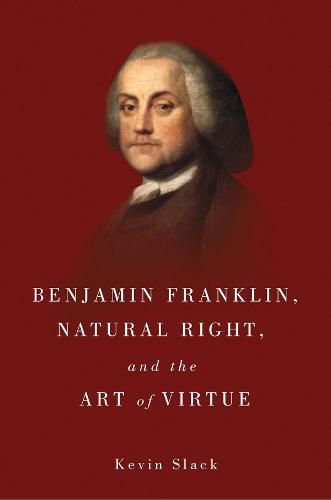Readings Newsletter
Become a Readings Member to make your shopping experience even easier.
Sign in or sign up for free!
You’re not far away from qualifying for FREE standard shipping within Australia
You’ve qualified for FREE standard shipping within Australia
The cart is loading…






Benjamin Franklin’s writings on politics are voluminous, and his own politics are well known, yet scholars debate – often fiercely – whether he had a political philosophy and, if so, what it was. Benjamin Franklin, Natural Right, and the Art of Virtue is a study of Franklin’s political and philosophical writings, tracing the development of his political thought and elucidating the political philosophy he came to embrace and put into practice.
Kevin Slack argues that Franklin, despite his reputation as a wit and clever politician, examined the nature of politics, virtue, and morality more deeply than any scholar has given him credit for. Franklin, as Slack demonstrates, rejected metaphysics during a period of youthful skepticism, adopting radical skepticism, but later abandoned that view for a third alternative, Shaftesbury’s common-sense philosophy. Engaging in a rigorous critique of religious and political authorities, Franklin rejected all authoritative claims but that of reason, which he used to investigate the nature of justice, or natural right. Slack shows here that Franklin was a thinker in the traditionof Socrates, and thus a political philosopher in the truest and highest sense.
Kevin Slack is assistant professor of politics at Hillsdale College.
$9.00 standard shipping within Australia
FREE standard shipping within Australia for orders over $100.00
Express & International shipping calculated at checkout
Benjamin Franklin’s writings on politics are voluminous, and his own politics are well known, yet scholars debate – often fiercely – whether he had a political philosophy and, if so, what it was. Benjamin Franklin, Natural Right, and the Art of Virtue is a study of Franklin’s political and philosophical writings, tracing the development of his political thought and elucidating the political philosophy he came to embrace and put into practice.
Kevin Slack argues that Franklin, despite his reputation as a wit and clever politician, examined the nature of politics, virtue, and morality more deeply than any scholar has given him credit for. Franklin, as Slack demonstrates, rejected metaphysics during a period of youthful skepticism, adopting radical skepticism, but later abandoned that view for a third alternative, Shaftesbury’s common-sense philosophy. Engaging in a rigorous critique of religious and political authorities, Franklin rejected all authoritative claims but that of reason, which he used to investigate the nature of justice, or natural right. Slack shows here that Franklin was a thinker in the traditionof Socrates, and thus a political philosopher in the truest and highest sense.
Kevin Slack is assistant professor of politics at Hillsdale College.